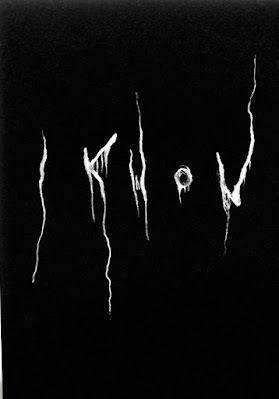REVIEW: Ikhon
 A common criticism against Mörk Borg is that it's all style and no substance. While I can see its critics' point, I also feel it's an unfairly reductive assessment of the 2020 dark fantasy game published by Free League. Certainly, a key element of Mörk Borg's appeal is its extravagant esthetics – a chaotic graphic design accentuated by riotous colors and moody, uneven illustrations. What's overlooked, I think, is that this sensibility is more than a mere artistic affectation but rather a deliberate design choice intended to convey as much to the reader as its text, proof of the old aphorism that a picture is worth a thousand words.
A common criticism against Mörk Borg is that it's all style and no substance. While I can see its critics' point, I also feel it's an unfairly reductive assessment of the 2020 dark fantasy game published by Free League. Certainly, a key element of Mörk Borg's appeal is its extravagant esthetics – a chaotic graphic design accentuated by riotous colors and moody, uneven illustrations. What's overlooked, I think, is that this sensibility is more than a mere artistic affectation but rather a deliberate design choice intended to convey as much to the reader as its text, proof of the old aphorism that a picture is worth a thousand words.Yet, I must admit that the game's latest release, Ikhon , skirts very close to prioritizing style over substance, especially when compared to its previous releases. Written by the game's creator, Pelle Nilsson, Ikhon comes in a small (6.25" × 4.5") box, inside of which are four, staple-bound 20-page booklets. Each booklet is dedicated to one of the four titular Ikhons, "ancient god-vessels of cured skin and soot-black wood, as rare and as valuable as they are blasphemous." These vessels are reputed to be the handiwork of the dark divinity Nechrubel, who bound within them "the Profane Profound," a quartet of lesser but nevertheless potent supernatural entities: the Bilkherd, the Becklure, the Old Dead, and the Silkfiend.
A character who somehow manages to obtain an Ikhon may call upon the powers of the Profane Profound shackled within. Doing so is not just a blasphemy according to the inquisitors of the Two-Headed Basilisks but also fraught with danger, as the powers of an Ikhon may rebound disastrously upon the wielder and/or his companions. Each booklet contains a brief description of one of the Profane Profound, along with pages numbered from one to "ten+." The pages detail an escalating series of responses to attempts to call upon one of these "age-old and nigh-forgotten folk gods." Which response a character gets is determined by a roll of a d8. The roll can be modified by +1 "for every willing human sacrifice" and "for each significant body part severed from the wielder of the Ikhon," to a maximum of +3. An Ikhon is thus a bit like a deck of many things or a wand of wonder from AD&D, an unpredictable source of power that can harm as well as aid.
The responses vary considerably. All are evocatively described, but many completely lack game mechanics of any kind. Consider, for example, the lowest (1) response in the Bilkherd's booklet:
He summons his Herd.
To the hateful goats, you are the field-poisoners, earth-salters, torch-wielders and slaughter's heralds. A thousand thousand strong, trampling all in their path and leaving only blood, sorrow and the dust of crushed bones.
All is obliterated under spiteful, churning hooves.
Meanwhile, the highest (10+) response in the same booklet is the following:
The Lamb from Beneath the Mud: heralded by rotten stench and glistening carmine eyes hanging at its hooves.
It devours one chosen foe, effortlessly masticating and grinding them whole, before sinking into the burbling muck.
Summon the Lamb within the hour – and never speak of it again.
As I said above, the responses are evocatively described, but, in many cases, I'd trade that for a little clarity. Now, I am not opposed to inspirational vagueness. Indeed, I think a degree of textual indeterminacy is a necessary feature of old school roleplaying games. Such indeterminacy serves to inspire; its an encouragement to make a game one's own by filling in the gaps oneself. Perhaps that's what's being done here, too, but, if so, it eludes me. Rather than inspiring, Ikhon simply feels frustratingly incomplete.
In some respects, Ikhon reminds me of Tékumel's The Book of Ebon Bindings, another RPG product that ostensibly introduces the summoning of powerful supernatural beings into its associated game. While Ebon Bindings is grandiloquent and Ikhon terse, both shed far less light on their subject matter from a gaming perspective than I – and I suspect most gamers – would find immediately useful. In the case of the former, one can at least luxuriate in its overblown language. Ikhon, though, mostly offers Samuel Arraya's gloomy artwork, which is something, I suppose,. Whether that's enough to justify the purchase of this product is an open question.
I wish I liked Ikhon more than I do. The idea behind it is a solid one, very much in keeping with the dark fantasy inspirations of Mörk Borg. As presented, though, I find it inadequate to its intended purpose. Others may feel differently and indeed I can easily imagine that the very things I find wanting, such as its gnomic text and limited game mechanics, might prove attractive to others. Goodness knows I often enjoy game products that others do not. In the end, I suppose my feelings about Ikhon derive from how much I've enjoyed previous Mörk Borg releases. Compared to them, this one fell flat and I am left disappointed.
James Maliszewski's Blog
- James Maliszewski's profile
- 3 followers



